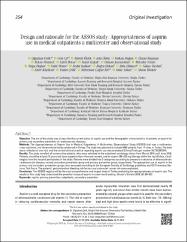Design and rationale for the ASSOS study: Appropriateness of aspirin use in medical outpatients a multicenter and observational study
Abstract
Objective: The aim of this study was to describe the current status of aspirin use and the demographic characteristics of patients on aspirin for primary and secondary prevention of cardiovascular diseases. Methods: The Appropriateness of Aspirin Use in Medical Outpatients: A Multicenter, Observational Study (ASSOS) trial was a multicenter, cross-sectional, and observational study conducted in Turkey. The study was planned to include 5000 patients from 14 cities in Turkey. The data were collected at one visit, and the current clinical practice regarding aspirin use was evaluated (ClinicalTrials.gov number NCT03387384). Results: The study enrolled all consecutive patients who were admitted to the outpatient cardiology clinics from March 2018 until June 2018. Patients should be at least 18 years old, have signed written informed consent, and on aspirin (80-325 mg) therapy within the last 30 days. Cardiologists from the hospital participates in the study. Patients were divided into 2 categories according to presence or absence of atherosclerotic cardiovascular disease, namely secondary prevention group and primary prevention group, respectively. The appropriate use of aspirin in the primary and secondary prevention groups was assessed according to the European Society of Cardiology guidelines and US Preventive Services Task Force. The patients' gastrointestinal bleeding risk factors and colorectal cancer risk were evaluated. Conclusion: The ASSOS registry will be the most comprehensive and largest study in Turkey evaluating the appropriateness of aspirin use. The results of this study help understand the potential misuse of aspirin in a real-world setting.
Source
Anatolian Journal of CardiologyVolume
20Issue
6URI
https://doi.org/10.14744/AnatolJCardiol.2018.47587https://app.trdizin.gov.tr//makale/TXpjd01qa3hNUT09
https://hdl.handle.net/20.500.12809/1269


















